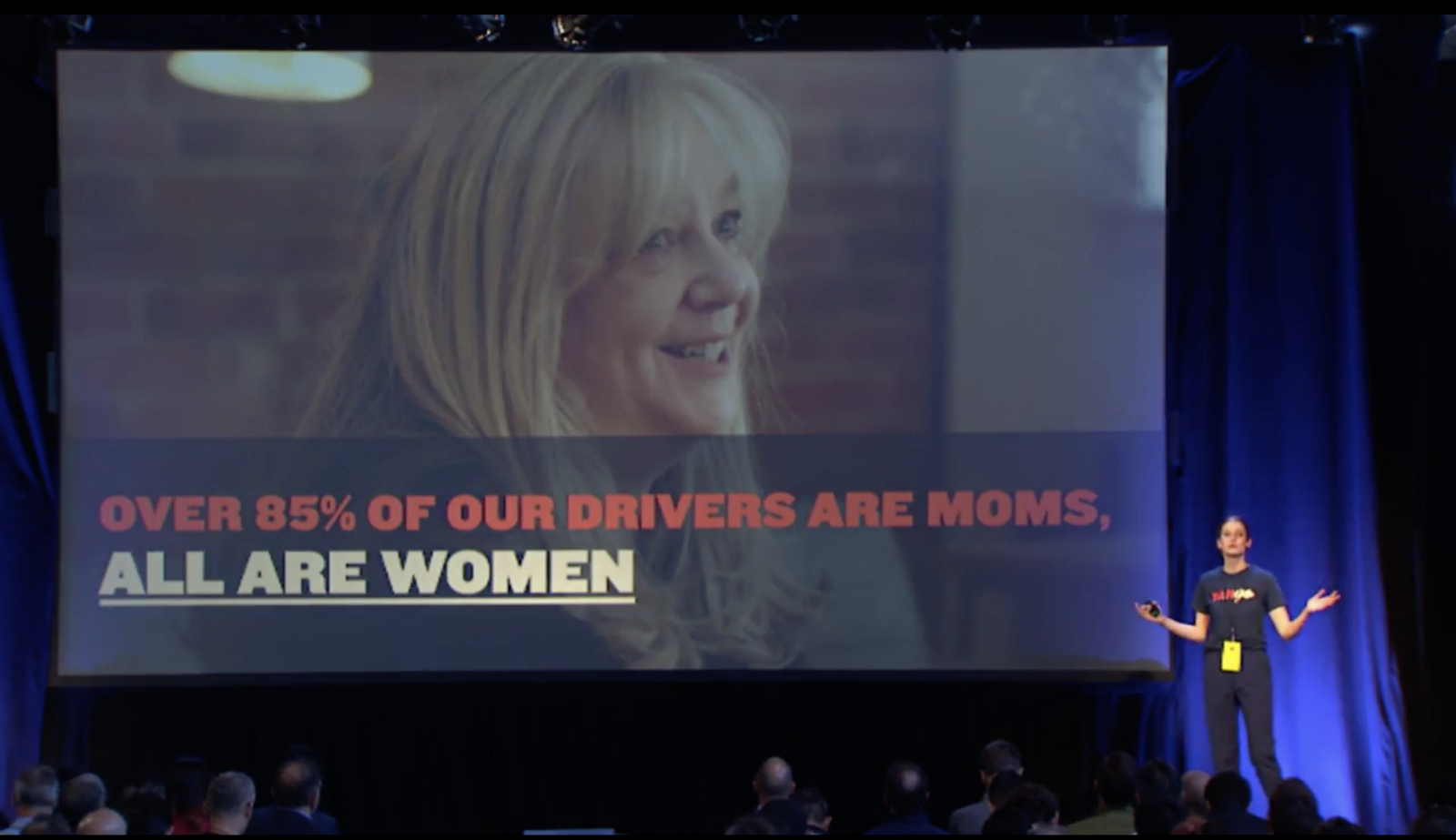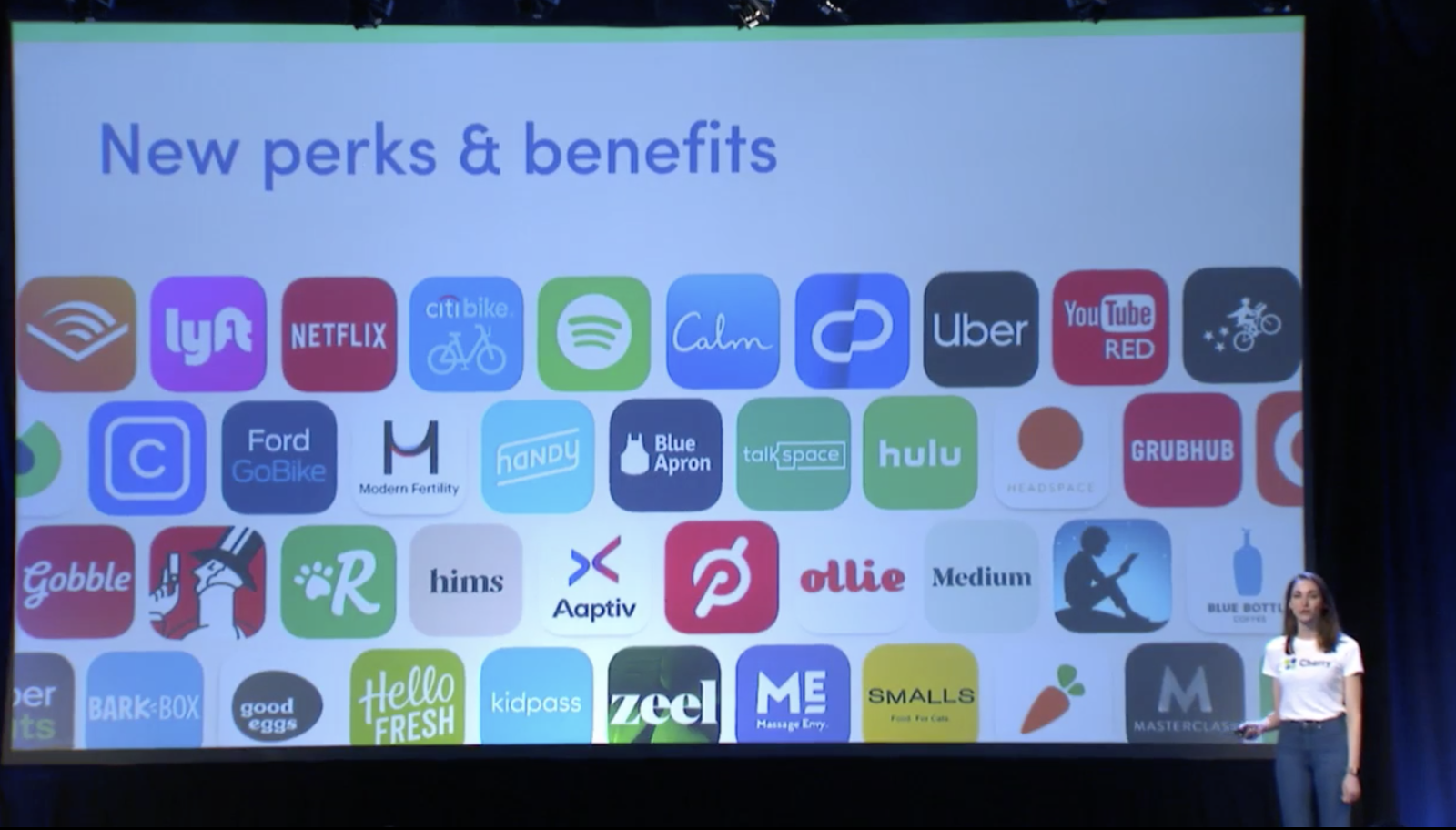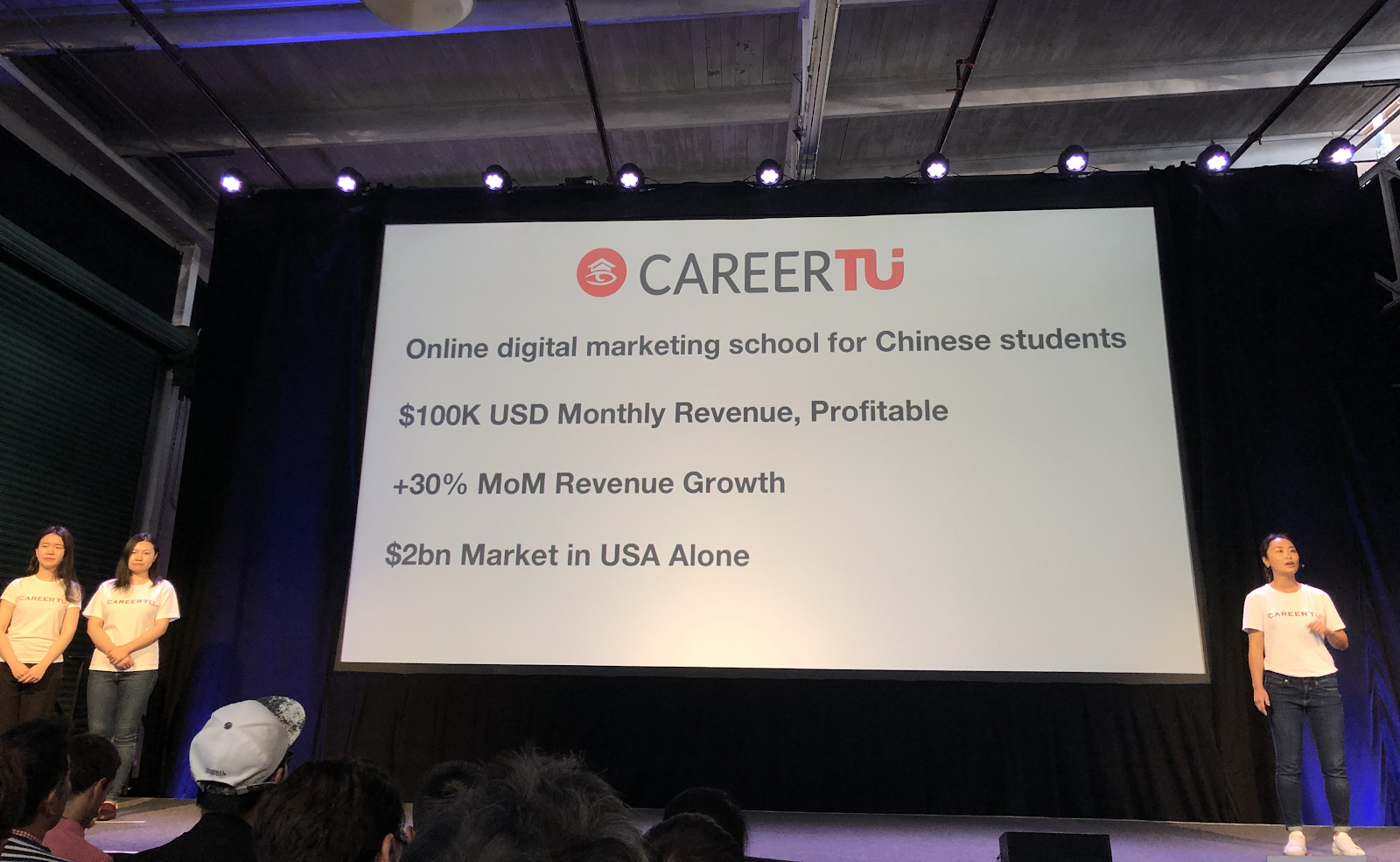We got to check out Y Combinator’s Winter 2019 cohort this week – the biggest one yet, with 189 companies – a 25% increase compared to last year.
Unfortunately, the increase in companies didn’t result in an increase in companies with a female founder: This year, the number decreased four percentage points from 28% (Summer 2018) to 24%. There are only 13 companies made up of a singular female founder or just female co-founders – this is 7% of the whole batch (compared with 76% representing companies with one male founder and only male co-founders). You can see more here on the diversity stats on the current batch.
A common sentiment we heard from the female founders we talked with was that, yes, it’s promising to see much more female representation in the VC space, but when you look around the room, you can still see that majority of the audience is male. It can make walking around the room somewhat daunting for female founders. Some founders said that they look for female VCs to speak to as a result, others say that it’s difficult to make eye contact with male VCs to strike up a conversation. Just see the tweet below:
Men’s vs women’s bathroom line at @ycombinator demo day… 🤣🤦♀️ pic.twitter.com/IwWChTgAo6
— Annie Case (@anniecase1) March 18, 2019
Another interesting observation: when there is a female and male cofounder in a team, the male cofounder pitches 80% of the time during demo day. This is part of the reason the distinction between funding going to all-women founding teams versus teams that have one woman founder on a mixed-gender founding team is so important: It’s rare that the woman founder is put out front, and many of the same conscious or unconscious biases still play out.
There’s still work to be done on the diversity front in the space in general, to be sure, but in the meantime, here are some of our favorite women-founded companies from the Winter Batch!
Catch
Kristen Tyrrell [Co-founder]
The future of work will see individuals with a few jobs, side gigs, and more all at once. However, these freelancers, gig workers, and contractors don’t have access to employer benefits. This affects over 80M workers in the US.
Catch is a personal benefits platform that acknowledges this changing relationship between employers and employees, and helps you handle taxes, retirement, time off, health insurance and more. What’s great about Catch’s benefits system is that the benefits are accessible and transferable if an individual moves from one company to another. This means individuals have the security and freedom to take risks in their career and to live on their own terms.
Fun fact:
Tyrrell has been asking every VC she meets what percentage of founders in their portfolio are female.
I've started asking every #VC we meet what % of founders in the portfolio are female. Today was the first time a partner gave an exact answer, admitted it was low, *and listed how the firm was fixing it.* Last step is key. VCs: You have to actually make a change. I am a fan. 👌
— Kristen (@CatchKristen) March 11, 2019
Though she noted that many VCs admitted that the percentage remains low across the board, it was promising to see a handful had prepared a comprehensive answer as to what they were doing to improve the pipeline of startups to improve the diversity issue in this space. Tyrell has been encouraging other founders in this batch to start asking this question because VCs need to start hearing it. The more they hear it, the more they’ll reflect and act on what they need to do to make their portfolio more diverse.
Bottomless
Liana Herrera [Co-founder]
Herrera and her Co-founder, who is also her husband, found it difficult to keep up with household chores and were looking for ways to ease their load. They wanted to tackle the repeat purchases that we buy over and over again every week, beginning with what we struggle without: Coffee.
Bottomless claims to be the next Amazon for repeat purchases.
How it works:
You receive a free smart scale with your first coffee order and the Bottomless scale will know exactly when you will need a refill and ship it to you at the perfect time. Did I mention that the beans are always freshly roasted?
They have the intention to move into pet food, diapers and other household items that you purchase over and over again, granting them a $1 trillion dollar opportunity for just-in-time shipments of all your favourite household items.
Our thoughts:
While I’m more of a tea drinker, I can totally relate to this. I am looking forward to the days when I can get a refill of freshly baked bread just in time when it runs out…
Not so fun fact:
Back when Herrera was fundraising in Seattle, an investor said ‘If this motivates your husband, what motivates you?’ Assuming that she was only helping her husband out on his passion…
VanGo
Marta Jamrozik [Founder]

A second time YC Founder, Jamrozik was inspired by her mom to found VanGo. When she was growing up, she saw her mom working full time as the breadwinner and also doing the majority of the household work, a situation very prevalent today, with 70% of moms working and experiencing the same social expectation of being responsible for childcare work.
Jamrozik wanted to create more support for mothers, starting with transport. Vango is Uber for kids, getting children to and from school and after school activities. The differentiating factor is that all the drivers are women who are fully vetted and who have at least three years of childcare experience. And over 85% of them are moms (!), while between 70 and 85% of Uber drivers are men. Marta plans to expand into other areas of need, such as homework help and food preparation.
YourChoice Therapeutics
Nadja Mannowetz and Dr. Polina V. Lishko [Co-Founders]
Have you heard of non-hormonal contraceptives for women? Maybe not. Have you heard of ‘the pill’ for men? Also probably not. YourChoice Therapeutics is here to change that, to change the terrible contraception options for women and to change the lack of options for men.
Their first product is a topical bio-degradable contraceptive that you apply before intercourse and oral contraceptive for both men and women. Both products target specific proteins in sperm that is needed for fertilization.
Our thoughts:
No mood swings, no risk of blood clots or cancer. Contraceptive that is safe. And did I mention: more equality for men and women, not relying on women to be the only one accountable for contraception. Count us in!
Fun fact:
The co-founders found it interesting talking to male investors about this product – starts off slightly awkward, but once they get past this temporary wall of awkwardness, they’re interested to focus on the scientific breakthrough of this solution.
Cherry
Emily O’Brien and Gillian O’Brien [Co-Founders]

Imagine being able to choose the perks that you get from your company? Cherry is here to give you all the perks that you will actually use. Think about Netflix and Spotify subscriptions or Uber and Lyft credits. While this is a great offering for employees, it offers a myriad of benefits to employers too:
- A cost saving solution for employers if they can forego buying that ping pong table or bean bags that their employees actually don’t care about
- Stand out from the crowd by offering a personalized benefit package
- Employee retention.
They’re currently a SlackBot solution offering employees a marketplace of subscriptions, where a personalised gift code is generated for each employee to use.
Our thoughts:
Yes, please! While nap pods and bean bags are nice-to-have’s, I think my ClassPass subscription or massage credits would make for a much better fit for my lifestyle and my definition of perks!
Fun fact:
On average companies spend $11K per employee on non health benefits that only 7% of employees actually use. If you have 100 employees, it means you’re wasting over $1M on wasted perks!
CareerTu
Ruiwan Xu, Yvonne Tian, Qian Qiao [Co-founders]
CareerTu, led by three female co-founders, is an online digital marketing school for Chinese students living in the US. Did you know that over 1M Chinese students come to the US to study? While these students are receiving a sound education, many universities leave out the most important part: gearing students up for real-life job skills and connecting them to the right employers.
The team was completely bootstrapped and took zero investment before YC, and they’re already profitable. Out of the 1M Chinese students abroad in the US, 160,000 of them are already signed up with CareerTu. They have set intentions to expand this offering to Chinese students studying at home in China, to solve the gap between what’s taught in school and what’s demanded in the workplace.

Fun fact:
During discussions with other investors during the Demo Day, many were quick to point out the stark contrast of three female co-founders standing on stage – not sure if this is a sign of progress or not…
Not so fun fact:
The Co-founders mentioned that they’ve been faced with the regular questions from VCs, like ‘Are you going to get married or have a baby anytime soon?’ Even my distant relatives have learned to avoid this question during Thanksgiving… come on!
Our World In Data
Hannah Ritchie [Co-founder]
Policymakers and world leaders need data and research to back up their decisions, but much of that data is locked up in academia and academic papers that are not easily digestible. This could result in bad global policymaking, with significant consequences to migration, healthcare, environment and more.
According to Hannah, the literature and data is presented in an esoteric way and going through each one is time consuming. This forces decision makers to resort to Google Search, which can be prone to misinformation. What Our World in Data offers is an open-access platform where you can easily access reliable data that has been translated into short summaries and interactive data visualisations.
Lumos
Archa Jain and Shubhi Nigam [Co-founders]
We already know typing in our symptoms and relying on Google Search for diagnosis makes no sense, but if medical experts and doctors are using Google Search to treat and diagnose patient, this is when it becomes a problem.
This is what Jain, a former engineer of Google Search, noticed amongst the doctors around her. She saw her sister, a surgeon, spend a lot of time looking up information on Google, which ‘serves the lowest common denominator, so it cannot give medical experts the best answer’. This inspired her to build a professional platform using language models that can beat human performance in question and answering, specifically built for medical experts. She claims it’s easier to iterate the product with a user pool of doctors, which allows her team to distinguish between trusted information doctors rely on and bad science.
Fun fact:
Did you know that 5% of all Google Search queries are medical related? And did you know that doctors also use Google Search for medical information?
Not so fun fact:
She was told by an investor that there was a strong bias against couples (one of her Co-founders is her husband). Something along the lines of ‘Starting startups is hard enough already. Why would you start one with your husband?.’
Allure Systems
Gabrielle Chou [Co-founder]
While they were working in fashion ecommerce, the Co-founders of Allure Systems realised that beautiful images sell, but producing these images costs a fortune – you would need a model, a photographer and a bunch of assistants.
Allure systems auto-generates images of styles on models of any size and ethnicity with AI and computer vision, offering brands and retailers the ability to create images instantly and to save up to 70% if they were to opt for the traditional route of photographers and models.
Why we love it:
Allure Systems is directly addressing the diversity of models in fashion photography because it can take a piece of clothing and display it on a wide variety of body shapes and sizes, thereby promoting size inclusivity in the fashion and ecommerce industries. Think about it: 67% of the population is a size 12 and above, so it’s not only about doing the right thing to represent our society, but it also makes sound economic sense. The ability to see what the piece of clothing looks like on someone else with the same size is a game changer.
Fun fact:
They have been asked if the female models that they digitalise are naked in investor meetings… not sure why this matters! Curiosity killed the cat?
Evo.do
Nataly Bendersky Shalem [Co-founder]
Evo.do offers codeless test automation for games. With Evo’s smart bots, game developers can focus on what matters and ensure that gamers get the best experience. In just 9 months, Bendersky Shalem and her Co-founder took inspiration from the research led by Open AI and Deepmind where AI beats human at video games, and adapted this research to game testing and built Evo.do. Similar to a scripted test, Evo.do is fast and scalable. You would need 12 human testers for the same test done by EVO.
They have the grand goal of replacing human testings in the world – think superhuman testing, but no human intervention.
Schoolable
Angela Essien [Co-founder]
There are over 65M students in Africa that attend K-12 private schools, which requires parents to make upfront tuition payments, but only 30% of these parents are able to do that. Schoolable is an invoicing app for schools that allows 46M parents in Africa to apply for credits to get loans to pay and save for tuition directly from their paycheck.
For schools, Schoolable provides them with a much-needed platform to upkeep infrastructure, vendor payments and payroll. They’ve already launched with four schools in the last nine months, collecting $2M in tuition. The momentum doesn’t stop there: they have over 180 schools on their wait list.
Avo
Stefania Olafsdottir [Co-Founder]
The Avo team already has a successful exit with their previous startup QuizUp, a mobile social trivia game with 100M+ users. While they were working together at QuizUp, they realized it was impossible to ship your code without breaking your analytics. This is bad since data bugs are permanent and can’t be rectified. Avo is here to stop this from happening.
How it works:
Product Managers update their analytics stacks in the Avo web app for every product release. Once developers pull generated code from Avo, their analytics is type-checked and monitored through every code change so it never breaks again.
Avo is currently used by a great slate of customers, like Sotheby’s, Skip Scooters, WOW air, and more.
Padpiper
Courtney Sabo [Co-Founder]
The Co-founders of Padpiper had to move an average of seven times a year for internships during university. Airbnb and Craigslist didn’t solve their problem of finding temporary housing, which made it all the more difficult to navigate the ambiguity of moving to a new place.
PadPiper helps traveling professionals, like interns, find short-term housing and is working with companies such as Tesla, Mozilla and Lyft to offer a better housing solution for interns. What’s more, PadPiper also matches you to housemates with similar interests and hobbies to ensure that you get along with your housemates.
Fun Fact:
I saw Sabo do an impromptu pitch at the YC Female Founders Conference as an attendee and it’s great to see her accepted and thriving in the current YC batch. Also, while she was at the XX accelerator, she also managed to squeeze in time to train for Squash National Tournament!
Truora
Maite Muniz Telleria [Co-Founder]
The Co-founders of Truora spotted the problem in Latin America that ‘fraud is a profession – it’s almost a way of life’. The resulting consequence is that one in ten gig worker steals from a marketplace startup, like Uber and Rappi.
Truora provides these companies a fast and reliable way to run background checks on their employees, at a low cost of $3 per background check. What’s exciting about Truora is that through these background checks they are building the most comprehensive database of fraudulent workers that they can then charge employers to access.
Not so fun fact:
When Muniz Telleria pitches alone, she gets more technical questions around how the technology works, how to ensure that it’s not going to crash, how she managed to build the platform so fast. But she’s noticed that when she’s pitching with her male Co-founders, they don’t get the technical questions as much and are asked more of the strategic questions, like the addressable market or hiring.
Bot Orange
Li Jiarui [Co-Founder]
Bot Orange claims to be the Intercom for WeChat, helping companies and agents on WeChat acquire, engage and retain customers in WeChat. According to Jiarui, ‘WeChat is the entire internet in China. Many Chinese people never even open the Web Browser.’
Currently, there are no tools built for WeChat for companies to manage their customers. BotOrange is changing this by offering a customer management tool for customer support tickets, chatbots or analytics, similar to Intercom. With over 1m agents and companies on WeChat, and BotOrange charging each $15K per year, this adds up to a total addressable market of $15B. This is unheard of in the US.
Tailor-ED
Yael Haramaty and Maayan Yavne [Co-founders]
The Co-founders of Tailor-ED saw that many children are filled with feelings of failure from a young age and think nothing will come of them. Children are especially prone to this feeling of failure in an education system that does not serve them well with its one-size-fits-all model.
These Co-founders wanted to focus on fixing the broken education system, understand the pedagogy and how technology can empower students. Taking inspiration from a framework and philosophy called differentiated instruction, coined in the 80s, Tailor-ED helps teachers create lesson plans that are tailored to the needs of students.
How it works:
A short quiz is sent to students to determine their needs and competency and to group them based on those needs. Over 2500 students have already received lessons from Tailor-Ed in just one month.
Why we love it:
If ads can be so targeted to each individual user to a point where I feel the devices around me are listening to me, education should be exactly of the same standard if not better. I love that the Co-founders are challenging the education system to push for more personalization and as a result, more empowerment.
Final Thought:
Now we know who’s been abusing the handshake protocol #YCDemoDay pic.twitter.com/k843Tj3mDg
— Adam Nelson (@adamn) March 20, 2019


